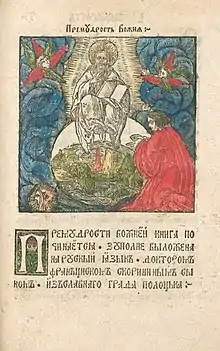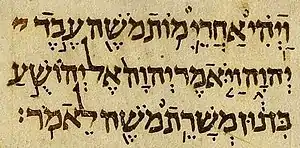Book of Wisdom
The Book of Wisdom, or the Wisdom of Solomon, is a Jewish work written in Greek and most likely composed in Alexandria, Egypt. Generally dated to the mid-first century BC,[1] the central theme of the work is "wisdom" itself, appearing under two principal aspects. The first aspect is, in its relation to humankind, wisdom is the perfection of knowledge of the righteous as a gift from God showing itself in action. The second aspect is, in direct relation to God, wisdom is with God from all eternity.[2] It is one of the seven Sapiential or wisdom books in the Septuagint, the others being Psalms, Proverbs, Ecclesiastes, Song of Songs (Song of Solomon), Job, and Sirach. It is included in the canons of the Catholic Church and the Eastern Orthodox Church. Most Protestants consider it part of the Apocrypha.

 | |||||
| Tanakh (Judaism) | |||||
|---|---|---|---|---|---|
|
|
|||||
| Old Testament (Christianity) | |||||
|
|
|||||
| Bible portal | |||||
Structure, genre and content
The structure can be divided into three sections:[3]
- Book of Eschatology
- exhortation to justice
- speech of the impious, contrasts of the wicked and the just
- exhortation to wisdom
- Book of Wisdom
- Solomon's speech concerning wisdom, wealth, power and prayer
- Book of History
- introduction, followed by diptychs of plagues
- digression on God's power and mercy
- digression on false worship and further plagues
- recapitulation and concluding doxology.
The book is addressed to the rulers of the earth, urging them to love righteousness and seek wisdom; the wicked think that all is chance and that they should enjoy each day, but they are deluded.[4] In the second section Solomon (not explicitly named, but strongly implied) tells of his search for wisdom.
The Wisdom of Solomon can be linked to several forms of ancient literature, both Jewish and non-Jewish, but it clearly belongs with biblical Wisdom books such as the Book of Job, one of only five such books among ancient Jewish literature.[5] In terms of classical genre it has been identified as an encomium and with the Greek genre of the "exhortatory discourse", by which a teacher attempts to persuade others to a certain course of action.[6]
Canonicity
Origen in the 2nd century refers to uncertainty about the Book of Wisdom.[7] Melito of Sardis[8] in the 2nd century AD, Augustine[9] (c. 397 AD) and Pope Innocent I (405 AD)[10][11] considered Wisdom of Solomon as part of the Old Testament. Athanasius writes that the Book of Wisdom along with three other deuterocanonical books, while not being part of the Canon, "were appointed by the Fathers to be read".[12] Epiphanius of Salamis (c. 385 AD) mentions that the Wisdom of Solomon was of disputed canonicity.[13] According to the monk Rufinus of Aquileia (c. 400 AD) the Book of Wisdom was categorized as "ecclesiastical" rather than "canonical".[14]
The Book of Wisdom was listed as canonical by the Council of Rome (382 AD),[15] the Synod of Hippo (393),[16] the Council of Carthage (397) and the Council of Carthage (419),[17][18] the Council of Florence (in 1442)[19] and the Council of Trent (in 1546).[20]
Composition
The Wisdom of Solomon was written in Greek, in Alexandria (Egypt), in the late 1st century BC or early 1st century AD. The author's prime literary source was the Septuagint, in particular the Wisdom literature and the Book of Isaiah, and he was familiar with late Jewish works as the Book of Enoch and with Greek philosophical literature.[21] It is uncertain whether the book has a single author or comes from a school of writers, but recent scholarship has favoured regarding it as a unified work.[22] In either case its blend of Greek and Jewish features suggests a learned Hellenistic background, and despite the address to the "rulers of the world" the actual audience was probably members of the author's own community who were tempted to give up their Jewishness in the face of the temptations of Greek culture and the hostile conditions facing Jews in the Greek world.[2]
Themes
The book opens with the opposed pairs righteousness/unrighteousness and death/immortality: those who do not follow righteousness will fall into "senseless reasoning" and will not be open to wisdom; wisdom is not an inherent human quality nor one that can be taught, but comes from outside, and only to those who are prepared through righteousness.[23] The suffering of the righteous will be rewarded with immortality, while the wicked will end miserably.[24] The unrighteous are doomed because they do not know God's purpose, but the righteous will judge the unrighteous in God's presence.[25] Lady Wisdom dominates the next section, in which Solomon speaks.[25] She existed from the Creation, and God is her source and guide.[25] She is to be loved and desired, and kings seek her: Solomon himself preferred wisdom to wealth, health, and all other things.[26] She in turn has always come to the aid of the righteous, from Adam to the Exodus.[2] The final section takes up the theme of the rescue of the righteous, taking the Exodus as its focus: "You (God) have not neglected to help (your people the Jews) at all times and in all places." (Wisdom of Solomon, 19:22).[2]
Influence
19th-century American author Herman Melville marked his copy of the Wisdom of Solomon heavily. Without knowledge of biblical criticism, he managed to note the interplay of Hellenistic Platonism and Jewish philosophy, writing, "this admirable book seems partly Mosaic & partly Platonic in its tone. Who wrote it I know not. Someone to whom both Plato and Moses stood for godfather."[27] The interplay of multiple philosophies is exemplified in many of Melville's works, specifically Moby-Dick and Clarel, wherein religious and philosophical interplay represent the struggle for certainty in the 19th century.
A considerable portion of the Wisdom of Solomon, starting with Chapter II, was read at a memorial service the day of the execution of the abolitionist John Brown, Concord, Massachusetts, December 2, 1859.[28]
See also
- Judgement of Solomon
References
- Jennifer Mary Dines (8 June 2004). The Septuagint. A&C Black. p. 19. ISBN 978-0-567-08464-4.
usually assigned to the late first century BCE
- Tanzer 1998, p. 294.
- Grabbe 2004, pp. 22–23.
- Grabbe 2004, p. 13.
- Grabbe 2004, p. 25.
- Grabbe 2004, pp. 25–26.
- Coogan, Michael; Brettler, Marc; Newsom, Carol; Perkins, Pheme (2018-03-01). The New Oxford Annotated Apocrypha: New Revised Standard Version. Oxford University Press. ISBN 978-0-19-027613-3.
- Eusebius. Church History (Book IV). Newadvent.org. Retrieved 2010-07-10.
- Augustine of Hippo. On Christian Doctrine Book II Chapter 8:2. newadvent. Retrieved 12 October 2016.
- Letter from Innocent I to Exsuperius, bishop of Toulouse.
- Westcott, Brooke Foss (2005). A general survey of the history of the canon of the New Testament Page 570 (6th ed.). Eugene, OR: Wipf & Stock. ISBN 1597522392.
- Athanasius of Alexandria, Excerpt from Letter 39
- Williams, translated by Frank (1987). The Panarion of Epiphanius of Salamis 8:6:1-4 (2. impression. ed.). Leiden: E.J. Brill. ISBN 9004079262. Archived from the original on 6 September 2015. Retrieved 11 October 2016.
- of Aquileia, Rufinus. Commentary on the Apostles' Creed #38. newadvent. Retrieved 12 October 2016.
- Decretum Galasianum
- "Canon XXIV. (Greek xxvii.)", The Canons of the 217 Blessed Fathers who assembled at Carthage, Christian Classics Ethereal Library
- B. F. Westcott, A General Survey of the History of the Canon of the New Testament (5th ed. Edinburgh, 1881), pp. 440, 541-2.
- Council of Carthage (in 419) Canon 24
- Session 11—4 February 1442
- Session IV Celebrated on the eighth day of April, 1546 under Pope Paul III
- Hayman 2003, p. 763.
- Grabbe 2004, p. 24.
- Hayman 2003, p. 764.
- Horbury 2007, pp. 655–656.
- Tanzer 1998, p. 293.
- Horbury 2007, p. 658.
- Melville, Herman (1987). Melville's Marginalia. New York: Garland. p. 315. ISBN 9780824000578.
- Redpath, James (1860). "Services at Concord". Echoes of Harper's Ferry. Boston: Thayer and Eldridge. pp. 437–454, at pp. 451–454.
Works cited
- Grabbe, Lester L. (2004). Wisdom of Solomon. A&C Black. ISBN 9780567084446.
- Hayman, A. Peter (2003). "The Wisdom of Solomon". In Dunn, James D. G.; Rogerson, John William (eds.). Eerdmans Commentary on the Bible. Eerdmans. ISBN 9780802837110.
- Horbury, William (2007). "The Wisdom of Solomon". In Barton, John; Muddiman, John (eds.). The Oxford Bible Commentary. Oxford University Press. ISBN 9780199277186.
- Tanzer, Sarah J. (1998). "The Wisdom of Solomon". In Newsom, Carol Ann; Ringe, Sharon H. (eds.). Women's Bible Commentary. Westminster John Knox Press. ISBN 9780664257811.